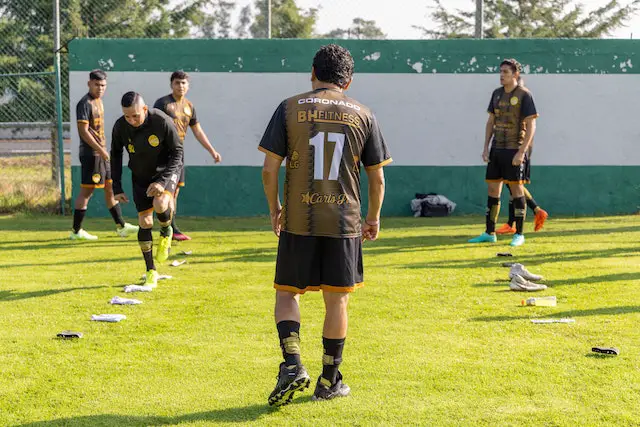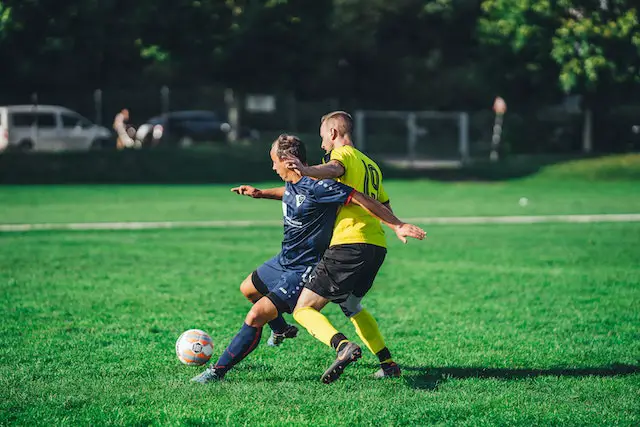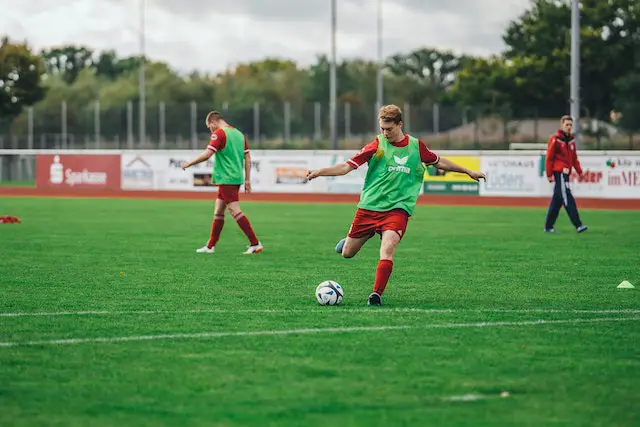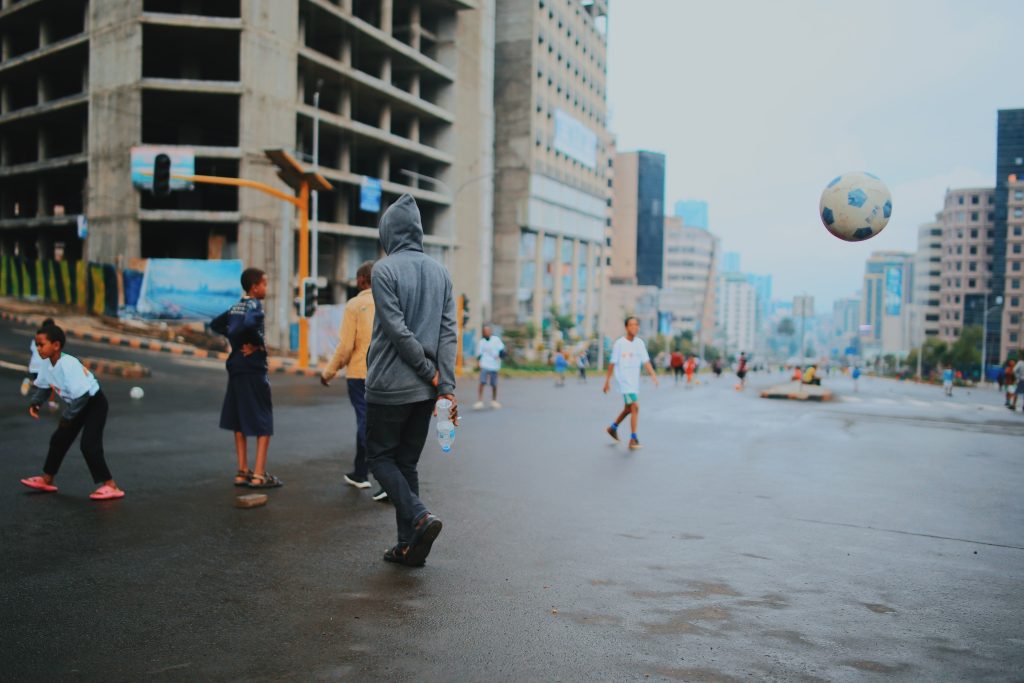Moving to a new country can be both exciting and challenging, especially when it comes to language barriers. As soccer players embark on international moves, they face the daunting task of adapting to a new language and culture.
Whether it’s joining a new sports team or communicating with coaches and teammates, navigating through linguistic obstacles can be a significant hurdle.
So, how do players deal with language barriers in these situations? We will be addressing that in this article. So stay tuned.
1. Language Preparation
1.1 Learning the Language Before the Move
Preparing for an international move involves learning the language of the destination country. Learning the language before the move not only helps you navigate daily life but also shows respect for the local culture. It is essential to familiarize yourself with the basics, such as greetings, common phrases, and basic vocabulary. This can be done through self-study using language learning resources or by enrolling in language courses.
1.2 Taking Language Classes
Taking language classes is a popular option for individuals who want a structured approach to learning a new language. Language classes usually provide a comprehensive curriculum that covers speaking, writing, reading, and listening skills. These classes are often taught by experienced language instructors who can guide you through the learning process. Additionally, interacting with other students in the class allows you to practice your language skills in a supportive environment.
1.3 Using Language Learning Apps
Language learning apps provide a convenient and flexible way to learn a new language. With the advancement of technology, there are numerous language learning apps available that offer interactive lessons, vocabulary exercises, and even speech recognition software. These apps allow you to learn at your own pace and can be accessed anytime and anywhere, making them ideal for busy individuals.
1.4 Hiring Language Tutors
If you prefer one-on-one instruction and personalized guidance, hiring a language tutor may be a suitable option for you. Language tutors can tailor their teaching methods to suit your learning style and pace. They can provide individual attention, correct your pronunciation, and help you improve specific areas of language learning that you find challenging. Tutors can also provide cultural insights and help you practice conversational skills.

1.5 Immersion Programs
Immersion programs are highly effective for learning a new language quickly and gaining cultural exposure. These programs immerse you in the language and culture of the destination country by providing intensive language courses, cultural activities, and opportunities to interact with native speakers. Whether you choose to participate in an organized program or simply surround yourself with native speakers, immersion programs offer a unique and immersive language learning experience.
2. Communication Tools
2.1 Language Translation Apps
Language translation apps have revolutionized how individuals communicate in foreign languages. These apps allow you to translate words, phrases, and even whole sentences on the go. Some translation apps even offer features like photo translation, where you can simply take a picture of a sign or text and have it translated instantly. Language translation apps can be incredibly helpful when dealing with language barriers in everyday situations.
2.2 Pocket Dictionaries
Carrying a pocket dictionary is a classic communication tool for language learners. Pocket dictionaries provide quick and easy access to translations and definitions of words. They are particularly useful when you encounter unfamiliar words or when trying to express complex ideas. While pocket dictionaries may not have the advanced features of language translation apps, they are reliable and do not require an internet connection.
2.3 Language Translation Devices
Language translation devices and services have become increasingly popular in recent years. These portable devices can translate spoken words in real-time, allowing for smooth and immediate communication. They usually offer a wide range of languages, making them highly versatile. Language translation devices are particularly useful when engaging in conversations or negotiations where accuracy and speed are crucial.
2.4 Language Learning Websites
Language learning websites offer a wealth of resources and tools for language learners. These websites often provide interactive lessons, vocabulary exercises, and language proficiency tests. Some websites also have forums or chat rooms where you can practice your language skills with native speakers or fellow learners. Language learning websites cater to all levels of language learners and can be accessed anytime and anywhere with an internet connection.
2.5 Language Exchange Programs
Language exchange programs provide a unique opportunity to practice a new language with native speakers. These programs typically involve finding a language partner who wants to learn your native language while you learn theirs. By engaging in conversations and language exchanges, both parties can improve their language skills. Language exchange programs can be done in person or online, depending on your location and preferences.
3. Team Support
3.1 Language Training Provided by the Team
In some cases, professional sports teams offer language training to their players who are moving to a different country. This type of language training is usually tailored to the specific needs of the athletes and focuses on improving their language skills for effective communication both on and off the field. Team-provided language training can greatly facilitate the players’ adaptation and integration into the new environment.
3.2 Language Interpreters
Language interpreters play a critical role in bridging the language gap between players and the local community. Interpreters are fluent in both languages and assist in translating conversations, meetings, and interviews. Having a language interpreter allows players to focus on their performance without the added stress of language barriers. Interpreters also help foster effective communication and understanding within the team.
3.3 Multilingual Teammates
Having multilingual teammates can be instrumental in easing the language barriers for players. Multilingual teammates can act as language mentors and provide support in both on-field and off-field situations.
They can help translate instructions from coaches, assist in communication with local players or staff members, and provide cultural insights. Multilingual teammates create a supportive environment for players to learn and adapt to the new language and culture.

3.4 Cultural Integration Programs
Some sports teams offer cultural integration programs to help their players adjust to their new surroundings. These programs typically involve workshops, cultural outings, and activities designed to introduce players to the local customs, traditions, and way of life. Cultural integration programs provide players with a deeper understanding of the local culture, enabling them to build stronger relationships with their teammates and the local community.
3.5 Language Classes Organized by the Team
Teams may organize language classes or workshops specifically tailored to their players’ needs. These classes can cover the basics of the local language, cultural norms, and practical vocabulary relevant to their daily lives. Language classes organized by the team are an effective way for players to develop language skills and enhance their overall communication abilities, both on and off the field.
4. Cultural Orientation
4.1 Working with Cultural Consultants
Cultural consultants help players navigate the cultural differences and nuances of the new country. They provide insights into the local customs, traditions, and social norms, helping players understand and respect the cultural sensitivities. Working with cultural consultants allows players to develop cultural intelligence and adapt more quickly to their new environment.
4.2 Cultural Training Sessions
Cultural training sessions are designed to familiarize players with the local culture and prepare them for the challenges they may encounter. These sessions cover topics such as etiquette, social norms, communication styles, and cultural expectations. Cultural training sessions equip players with the necessary knowledge and skills to navigate cultural differences and build meaningful relationships in their new environment.
4.3 Researching and Studying the Culture
Before the move, players can engage in independent research and study of the local culture. This involves reading books, articles, and online resources about the country’s history, customs, and traditions. By familiarizing themselves with the culture beforehand, players can develop a greater appreciation and understanding of their new surroundings, making the transition smoother and more enjoyable.
4.4 Attending Cultural Events and Festivals
Attending cultural events and festivals is an excellent way for players to immerse themselves in the local culture. These events offer firsthand experiences of the traditions, music, and cuisine of the destination country. By actively participating in cultural events, players can gain a deeper appreciation for the local customs and connect with the community on a more personal level.
4.5 Engaging with the Local Community
Engaging with the local community is crucial for players to integrate and feel at home in their new country. This can involve joining local clubs or organizations, volunteering, or simply striking up conversations with neighbors or shopkeepers. By actively engaging with the local community, players can build relationships, practice their language skills, and gain a better understanding of the local culture.

5. Patience and Adaptability
5.1 Accepting Language Challenges
Moving to a new country brings inevitable language challenges. It is essential for players to accept these challenges and approach them with a positive mindset. Understanding that language learning takes time and effort allows players to be patient with themselves and persevere through the difficulties that may arise along the way.
5.2 Remaining Patient during Language Barriers
When faced with language barriers, it is crucial for players to remain patient and not get discouraged. Communication mishaps and misunderstandings are normal in the early stages of language learning. By remaining patient and understanding, players can effectively navigate these barriers and find alternative ways to communicate and connect with others.
5.3 Improvisation and Non-Verbal Communication
In situations where language barriers make verbal communication challenging, players can rely on improvisation and non-verbal communication. This can involve gestures, facial expressions, and body language to convey messages. By adapting and finding creative ways to communicate, players can bridge the gap until their language skills improve.
5.4 Learning from Mistakes
Making mistakes is an essential part of the language learning process. Players should embrace their mistakes as learning opportunities rather than viewing them negatively. By learning from their mistakes, players can continuously improve their language skills and become more confident in their ability to communicate effectively.
5.5 Embracing Cultural Differences
Successful adaptation to a new country involves embracing cultural differences. Instead of resisting or comparing the new culture to their own, players should approach it with an open mind and a willingness to learn. Embracing cultural differences allows players to develop a deeper understanding and appreciation for their new environment, fostering a sense of belonging and integration.
6. Seeking Professional Help
6.1 Hiring Language Coaches
Language coaches specialize in language instruction and can provide individualized support to players. They can assess language proficiency, design tailored language learning programs, and offer guidance and feedback. Hiring a language coach can accelerate the players’ language learning progress and provide them with valuable insights and strategies to overcome language barriers.
6.2 Enlisting the Help of Interpreters
Interpreters can assist players in various settings where accurate and smooth communication is essential. By enlisting the help of interpreters during meetings, interviews, or public events, players can ensure that their messages are accurately conveyed to others. Interpreters act as language bridges and allow players to fully participate in discussions and interactions without the added burden of language barriers.

6.3 Consulting Language Experts
Language experts can provide specialized advice and strategies to players dealing with language barriers. These experts are well-versed in language acquisition and can offer guidance on the most effective language learning methods and techniques. Consulting with language experts can help players optimize their language learning journey and overcome any obstacles they encounter.
6.4 Joining Expat Support Organizations
Expat support organizations are valuable resources for players moving to a new country. These organizations provide assistance in areas such as language learning, cultural integration, and navigating the various administrative processes. They often organize social events and activities that allow players to connect with other expatriates and gain support from a community of individuals going through similar experiences.
6.5 Attending International Relocation Seminars
International relocation seminars offer a wealth of information and practical advice for individuals moving abroad. These seminars cover various aspects of living in a new country, including language learning, cultural adaptation, and professional networking. Attending these seminars provides players with valuable insights, resources, and networking opportunities to facilitate their transition into a new language and culture.
7. Networking and Building Relationships
7.1 Engaging with Local Players
Engaging with local players is an effective way for players to improve their language skills and gain insights into the local culture. By building relationships with their teammates and engaging in regular conversations, players can practice their language skills in a supportive and natural environment. Local players can also act as guides and mentors, helping players navigate the intricacies of the local language and culture.
7.2 Participating in Team-Building Activities
Team-building activities provide opportunities for players to strengthen relationships and foster effective communication within the team. These activities often involve group exercises, problem-solving tasks, and bonding experiences. By participating in team-building activities, players can develop trust and understanding, ensuring smooth communication and collaboration both on and off the field.
7.3 Attending Social Events
Attending social events allows players to expand their network and interact with individuals outside of their team. Social events provide casual settings for players to practice their language skills and engage in conversations with locals. By actively participating in social events, players can form connections with the local community and broaden their cultural understanding.

7.4 Utilizing Social Media Platforms
Social media platforms offer a convenient way for players to connect with others, particularly in the early stages of their language learning journey. Players can join language exchange groups, follow language learning accounts, and engage in online discussions. Social media platforms provide a supportive online community where players can practice their language skills, ask questions, and receive feedback from native speakers.
7.5 Joining Local Sports Clubs
Joining local sports clubs not only offers opportunities for players to engage in their beloved sport but also facilitates language learning and cultural integration. Playing alongside local players provides practical exposure to the language and allows players to observe and participate in the local sports culture. Local sports clubs can also serve as a social hub, connecting players with like-minded individuals and expanding their social circle.
8. Personal Language Learning Strategies
8.1 Setting Language Learning Goals
Setting language learning goals helps players stay motivated and focused on their language learning journey. Whether it is achieving a certain level of fluency or mastering specific language skills, setting clear goals provides a sense of direction and purpose. Players can break down their goals into smaller, achievable milestones, making the language learning process more manageable.
8.2 Creating a Language Study Routine
Establishing a consistent language study routine is essential for effective language learning. Players should allocate dedicated time for language practice each day or week, depending on their schedule. Having a routine creates a habit and ensures regular language practice, leading to steady progress over time. Consistency is key when it comes to language learning.
8.3 Watching Movies and TV Shows in the New Language
Watching movies and TV shows in the new language is a fun and engaging way for players to improve their language skills. By immersing themselves in the language through authentic content, players can enhance their listening comprehension, vocabulary, and cultural understanding. Subtitles can be used initially, and as players’ language skills improve, they can gradually switch to watching without subtitles.
8.4 Reading Books and Newspapers in the New Language
Reading books and newspapers in the new language exposes players to a wider range of vocabulary, idioms, and grammar structures. This helps players deepen their understanding of the language and improves their reading skills. Starting with simple texts and gradually progressing to more complex materials allows players to challenge themselves and expand their language abilities.
8.5 Practicing Conversations with Native Speakers
One of the most effective ways to improve language skills is by engaging in conversations with native speakers. Players can seek out language exchange partners, join conversation clubs, or simply strike up conversations with locals. Regular practice with native speakers allows players to hone their pronunciation, fluency, and confidence in using the language in real-life situations.
9. Overcoming Frustration and Culture Shock
9.1 Seek Emotional Support
Moving to a new country comes with its fair share of challenges, including language barriers and culture shock. It is important for players to seek emotional support from teammates, friends, or family members. Talking about the frustrations and difficulties they may encounter can provide players with perspective, encouragement, and a sense of camaraderie.
9.2 Accepting Cultural Differences
Culture shock is a common experience when moving to a different country. Players can overcome culture shock by accepting and embracing the cultural differences they encounter. It is essential to approach the new culture with an open mind and a willingness to adapt. By actively seeking to understand and appreciate the local customs, players can navigate cultural differences more effectively.
9.3 Understanding Stages of Culture Shock
Understanding the stages of culture shock can help players anticipate and cope with the emotional and psychological challenges that come with living in a new culture. These stages typically include the honeymoon phase, the frustration phase, the adjustment phase, and finally, the acceptance phase. By recognizing the stages of culture shock, players can develop strategies to navigate each phase successfully.
9.4 Embracing the Adventure
Moving to a new country presents an opportunity for personal growth and an exciting adventure. Instead of focusing solely on the challenges, players should embrace the adventure and view it as a chance to learn, expand their horizons, and develop resilience. Approaching the experience with a positive and adventurous spirit helps players overcome any obstacles they may face along the way.
9.5 Seeking Professional Counseling
In some cases, the emotional and psychological challenges of adapting to a new culture may require professional counseling. Players who are struggling with culture shock or experiencing intense feelings of frustration should consider seeking professional help. Counseling can provide the necessary support and strategies to overcome emotional challenges and facilitate a smoother transition into the new language and culture.
10. Constant Learning and Improvement
10.1 Continuing Language Classes

Language learning is a continuous process, and players should consider continuing their language classes even after their initial integration into the new country. Language classes can provide ongoing guidance, feedback, and exposure to advanced language skills. By continuing language classes, players can maintain and further improve their language proficiency.
10.2 Regular Language Practice
Consistent language practice is essential for maintaining and improving language skills. Players should dedicate time regularly to practice their language skills, even after reaching a certain level of fluency. Language practice can include conversing with native speakers, reading, writing, and listening to materials in the target language. Regular practice ensures players’ language skills remain sharp and continue to develop.
10.3 Expanding Vocabulary
Expanding vocabulary is an ongoing process in language learning. Players should actively seek out opportunities to learn new words and phrases. This can be done through reading, listening to podcasts or audiobooks, and engaging in conversations with native speakers. By continuously expanding their vocabulary, players can express themselves more accurately and confidently in the new language.
10.4 Learning Slang and Idioms
To truly master a language, players should strive to learn slang and idiomatic expressions. Slang and idioms are an integral part of everyday language and can greatly enhance communication skills. Players can learn slang and idioms through conversations with native speakers, watching popular TV shows, or reading contemporary literature. Incorporating slang and idioms into their language repertoire allows players to connect more effectively with the local community.
10.5 Improving Pronunciation
Pronunciation is a crucial aspect of effective communication. Players should continuously work on improving their pronunciation to ensure their messages are conveyed accurately. Listening to native speakers, imitating their intonation and rhythm, and practicing pronunciation exercises can help players refine their pronunciation skills. Seeking feedback from native speakers or language instructors is also beneficial in identifying areas for improvement.


